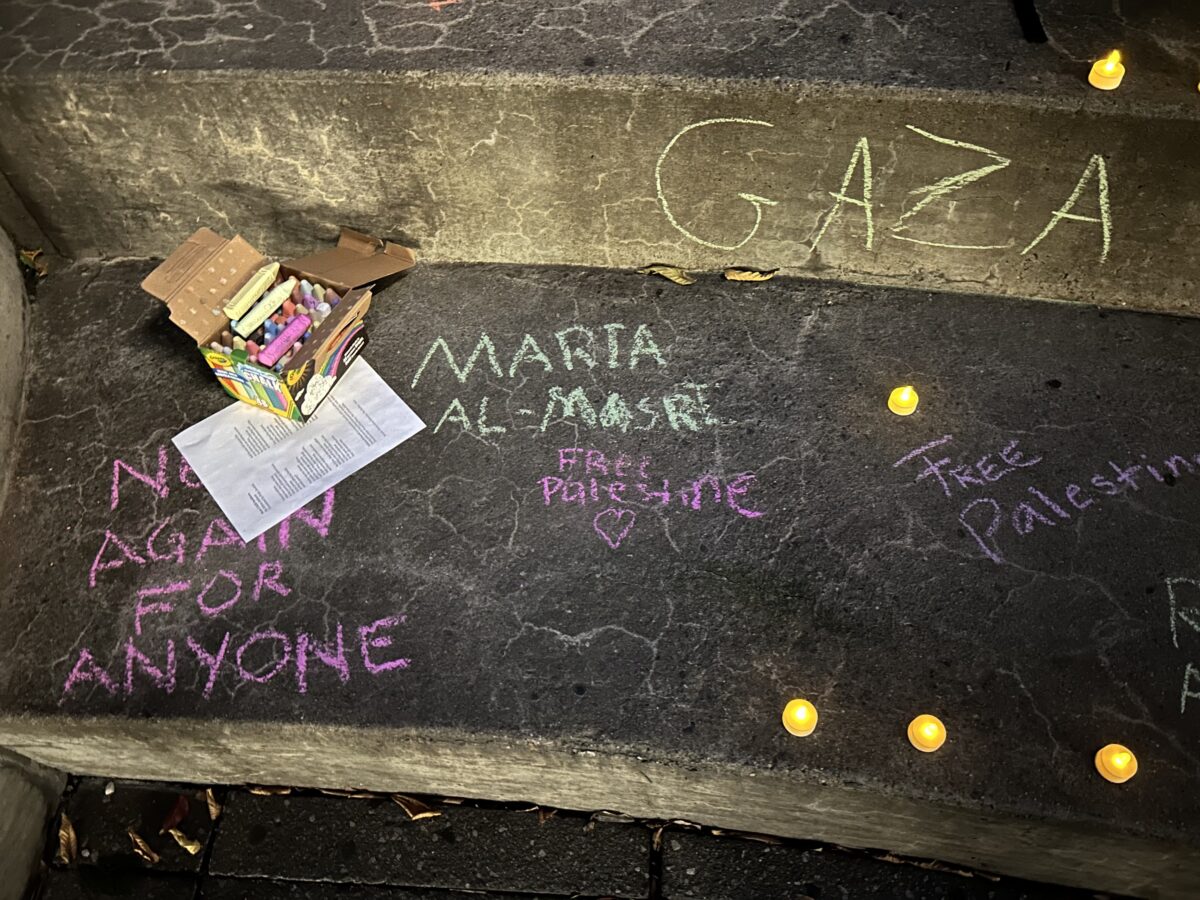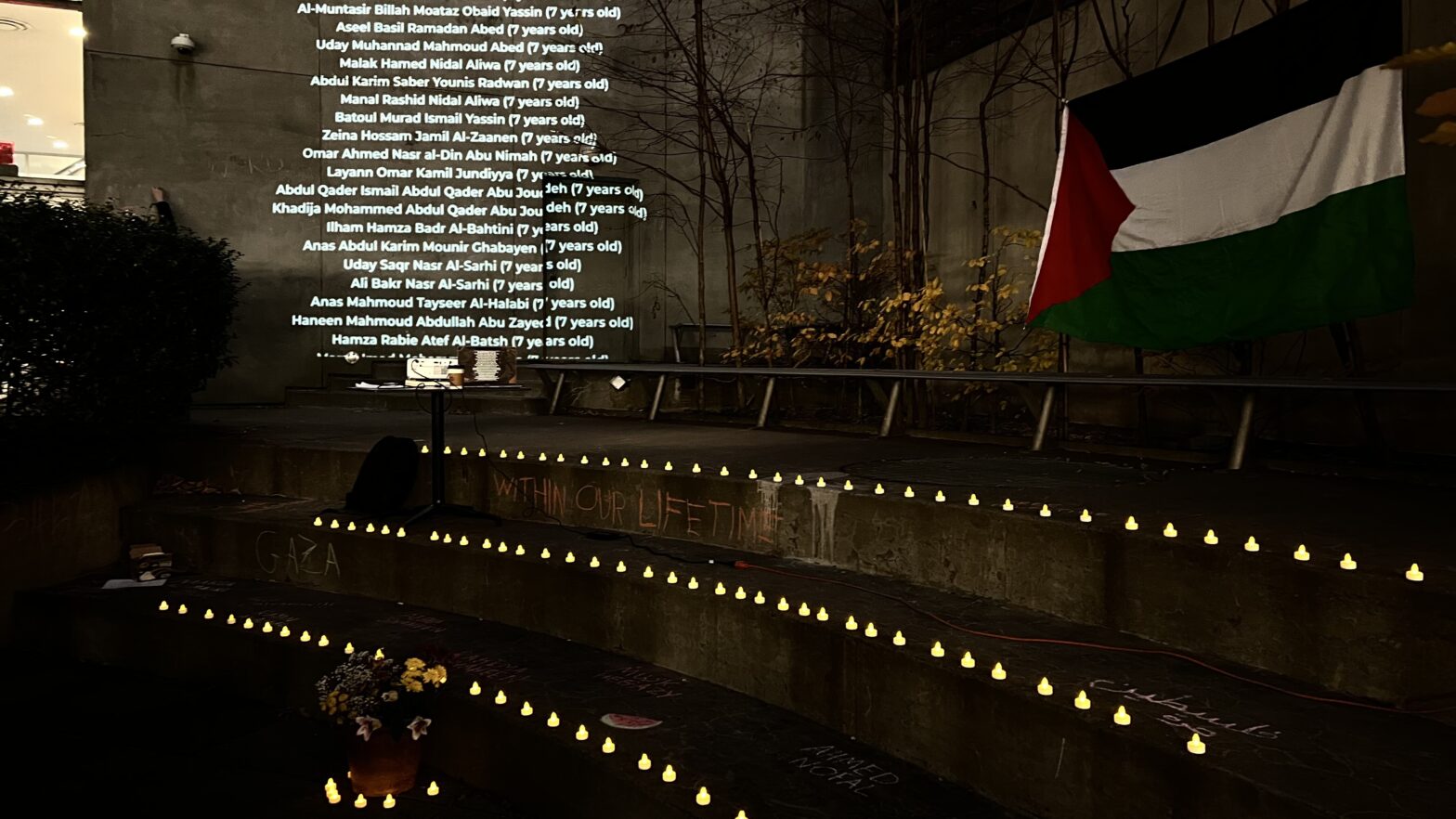On Wednesday, Dec. 6, The New School’s chapter of Students For Justice in Palestine (SJP) continued their Week of Action by hosting a candlelight vigil in the Eugene Lang College of Liberal Arts Courtyard. It began at 4 p.m. and lasted for roughly an hour as about 40 students, faculty, and alumni gathered to honor the Palestinian lives lost in Gaza. The vigil comes a day after a contentious walkout also organized by SJP.
Around 100 small battery-powered candles lined the stone stairs on the edge of the Lang Courtyard, and a large Palestinian flag hung from barren trees behind the steps. Phrases like “within our lifetime” and “never again for anyone” along with several names were written in colorful chalk between the rows of candles.

At 4:04 p.m., a group of faculty members from TNS Faculty in Justice for Palestine (FJP) arrived, one with a bouquet of flowers which she placed in front of the candles. A projector was positioned to the left of the candles, displaying a presentation for the duration of the vigil. The opening screen depicted three simple yet emotionally charged sketches of desperate embraces with the words “60 days, and 75 years of occupation” typed in green above.
The vigil officially began around 4:20 p.m. as conversations among the crowd hushed and attention was directed to a member of SJP for an opening statement. They said, “We gather here in order to acknowledge an unspeakable loss of life. We gather because a movement that separates itself from the full breadth of human emotion is not a movement that will last. We gather because those in Gaza have no choice but to face what they’re going through.”
Throughout the vigil, a rolling list of names of fallen Gazans remained projected on the 12th Street wall of the Lang Courtyard. The names were sorted by age, noted in parentheses, beginning with 0 years old.
The president of the Jewish Culture Club, Ramona Saft, was also among the speakers for the evening. She read a traditional Jewish prayer for mourning as the crowd silently bowed their heads and listened. She read “The Mourners Kaddish,” which she said is “usually for the loss of family members, but in this moment of extreme loss of life, it’s very relevant to remember those that have died and call us to action.”
A stack of printed poems were weighed down by a couple of candles on a nearby table, mostly written by Palestinian poets and authors. Members of SJP encouraged those in the crowd to take poems from the stack and participate in the reading as a way of honoring those who lost their lives in Gaza.
“Travel Tickets,” a poem written by Samih al-Qasim and translated by A.Z. Foreman, was read aloud in both English and Arabic by a faculty member from FJP. Al-Qasim was known internationally as an Arab poet, and his works of poetry have been used in revolutionary chants and songs.
Elly O’Scanlon, a freshman at the College of Performing Arts who attended the vigil, read the poem “Moon Over Gaza” by Arab American poet Naomi Shihab Nye.
“I’m at this vigil today because I have been continuously heartbroken seeing the innocent people, the innocent Palestinians being killed and being displaced. I think that to provide a space to honor them is really nice,” O’Scanlon told the New School Free Press before the vigil began.
Each reader was met with silent appreciation from the crowd, except for gentle applause, which came after the final speaker read a work of their own.
Throughout the vigil, TNS campus security officials hovered inside by the doors of Johnson/Kaplan Hall and Lang, moving between the two buildings that lead into the Lang Courtyard.
Around 4:53 p.m., the vigil concluded with closing remarks by a speaker from SJP: “I want everybody to keep in mind that this is not a religious issue, per se. This is a human issue. As you continue to spend time with your families over the holiday, remember that people right now don’t have that privilege. They’re not going to be allowed to have that privilege fully…until there is a permanent ceasefire, until the siege is lifted, and until there’s liberation for the Palestinian state.”








Leave a Reply